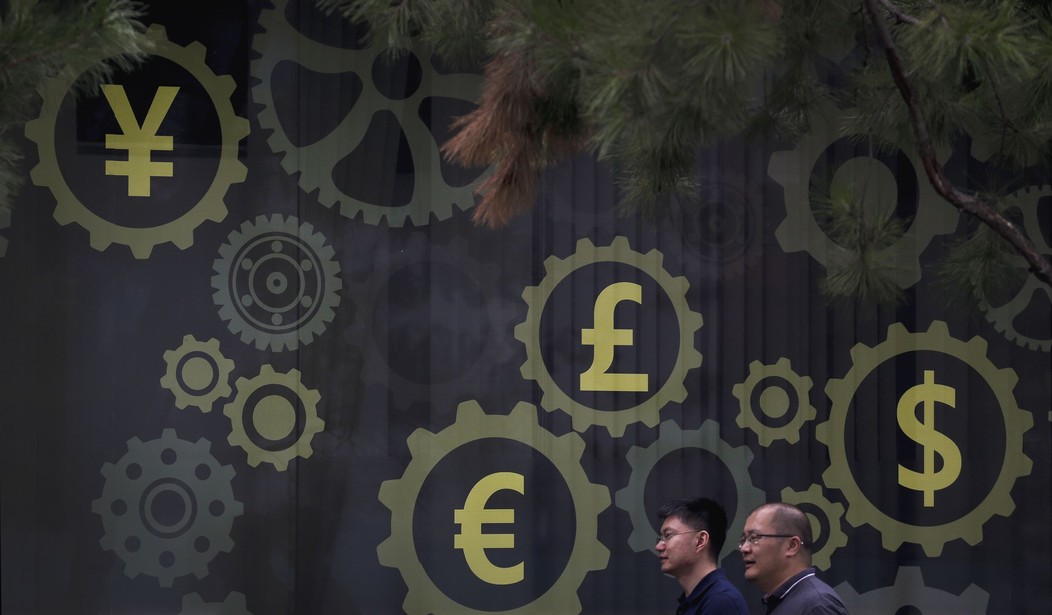One of the reasons the U.S. is still the dominant world power despite Joe Biden the Blundering Buffoon is because of the dollar’s status as world reserve currency. But two U.S. rivals last week took key steps toward “de-dollarization.”
Nations interested in undermining the U.S., including Communist China and Russia, have long been looking for ways to attack the dollar’s world reserve currency status. Unfortunately, a boneheaded move from Biden and co. at the just-ended G7 summit spurred a sudden and potentially damaging move from Russia. This coincided with Saudi Arabia’s decision to end a decades-old petrodollar deal. And who’s the winner in the whole financial mess? Communist China, America’s number one enemy. That’s the Biden administration’s usual catastrophic decision-making on the world stage!
The Biden administration promised to underwrite a new $50 billion “loan” for Ukraine, which is bad enough considering America doesn’t really have the money it is already spending, but the G7 apparently decided to make the situation worse. And whatever you think of Russian dictator and former KGB spy Vladimir Putin, it is entirely understandable why he and other Russian officials would be outraged by the following news from The New York Times:
The United States and the West’s other large economies have agreed on a plan to issue a roughly $50 billion loan to Ukraine that would be repaid by interest and profits from nearly $300 billion in frozen Russian assets held in the West.
The Biden administration has also announced more than 300 new sanctions against Russia. Within an hour of the U.S. sanctions being announced, according to Reuters, and in spite of it being a Russian public holiday, the Moscow Exchange and the Russian Central Bank both reacted. And that reaction is another step away from the U.S. dollar’s global reserve status, with a victory for the genocidal Chinese Communist Party (CCP) and its currency.
Reuters quoted the central bank’s statement, “Due to the introduction of restrictive measures by the United States against the Moscow Exchange Group, exchange trading and settlements of deliverable instruments in U.S. dollars and euros are suspended.” The outlet further clarified that this will prevent banks, companies, and investors from trading dollars or euros via a central exchange. That trading “offers advantages in terms of liquidity, clearing and oversight,” but the Russians evidently prefer direct over-the-counter (OTC) deals and some inconvenience to simply taking the sanctions lying down.
What I found particularly interesting is the comment Reuters received from an individual at a “large, non-sanctioned Russian commodities exporter” who indifferently observed, “We don't care, we have yuan. Getting dollars and euros in Russia is practically impossible.” Score one for the CCP, which aims to supersede the U.S. as the dominant global power and, therefore, wants its yuan to strengthen as the dollar weakens. Both Russia and China are among the BRICS coalition of nations that has avowed goals of de-dollarization.
One of the newer members of BRICS also undermined the dollar’s status this week as Saudi Arabia decided not to renew a petrodollar deal with the U.S. that was originally signed in 1974 and thus has existed for 50 years. India Today described the newly defunct deal as having been “a key part of US global economic influence,” and specifically noted that the Saudis can now sell oil and other goods using a variety of currencies rather than just the dollar — including the Chinese yuan. Score again for China.
India Today explained that the Saudis’ decision is “expected to accelerate the global trend of using currencies other than the US dollar in international trade.” After all, the U.S. dollar hasn’t been gold-backed since the 1970s; rather, it relies on the petrodollar system. What happens if the dollar loses its reserve currency status, given how much debt the U.S. has racked up based on that status? Saudi Arabia also joined the collaborative Project Bridge, which looks to have a digital currency platform that would connect both central banks and commercial banks.
The dominance of the U.S. dollar is not over yet, but with Biden sabotaging it at home and abroad, and with America’s enemies eager to find alternatives, we could be looking at a major international financial upheaval in the near future.










